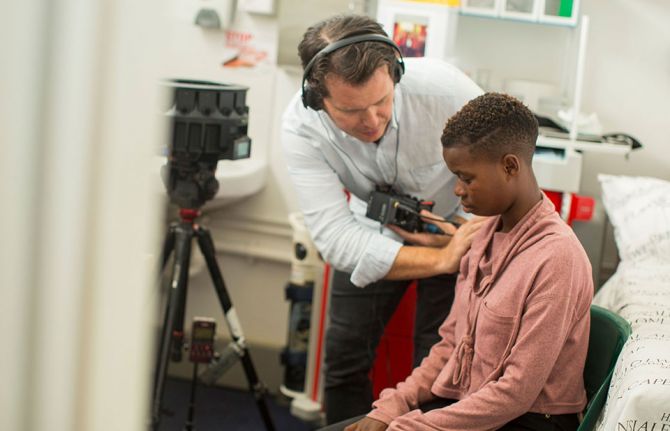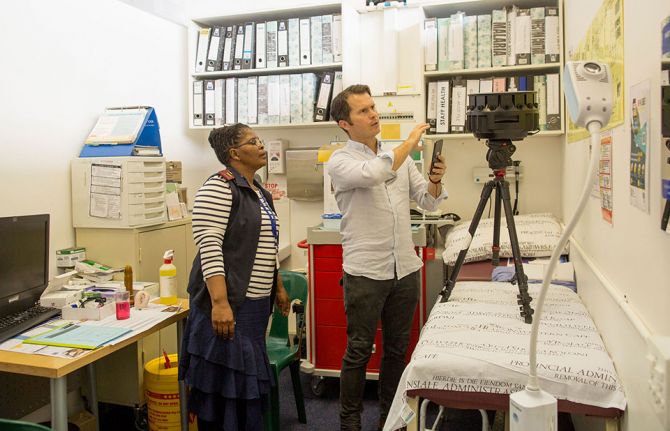



Press Release
UNAIDS teams up with Google and Makhulu Media to release virtual reality educational films about HIV testing
20 November 2018 20 November 2018360HIV harnesses the power of immersive technology to reach young people
GENEVA, 19 November 2018—Ahead of World AIDS Day, which takes place on 1 December, UNAIDS is releasing a series of virtual reality (VR) films focused on HIV testing.
Using the latest technology, the films help to demystify HIV testing. With goggles that viewers can wear for a full VR experience, the aim is to reach young people who may want to know their HIV status but are afraid or worried about taking an HIV test.
In the films, a group of talented young people re-enact several scenarios of a young woman’s journey to find out her HIV status. Going from her home to a local health clinic, the films allow viewers to explore different settings through a 360-degree experience.
Makhulu Media, a South African production company produced the VR films, with guidance from UNAIDS and the support of Google, the Desmond Tutu HIV Foundation and the Children's Radio Foundation, which were filmed entirely in the township of Nyanga, near Cape Town, South Africa.
“HIV is preventable and treatable but too few young people know their status,” said UNAIDS Executive Director Michel Sidibé. “We hope that this highly engaging tool will help to dispel fears and show the simple steps that people can take to find out their HIV status.”
At the beginning of the project, Makhulu Media organized workshops with young people to discuss their knowledge of HIV, to share their interactions with health-care providers and to describe their experiences while visiting clinics. The next step involved filming non-actors re-enacting scenes between patients and health-care workers. The short films address the fear of a positive test result and HIV-related stigma.
“We wanted to see if immersive virtual reality films could encourage people to take an HIV test and improve relationships between nurses and young people by helping them to step into each other’s shoes,” said Makhulu Media producer Rowan Pybus.
“The data coming back from the study we have commissioned are very positive,” case study researcher and Makhulu Media co-producer Sydelle Willow Smith said. “The youth and health-care workers involved in the film believe that having the films played to people in waiting rooms in clinics would be very useful.”
The films are being rolled out in clinics, schools and communities in South Africa. Despite progress in reducing AIDS-related deaths and in people accessing treatment, new HIV infections in 2017 in South Africa reached 270 000. This is down from a high of 530 000 in 1998, but the country has 7.2 million people living with HIV—the highest in the world. Google Program Manager Sarah Steele believes that the potential for VT to produce positive social impact is enormous.
“360HIV is a powerful example of how virtual reality can help change the attitudes and beliefs that underlie some of the world’s most urgent social and environmental challenges,” she said.
A quarter of the 37 million people living with HIV in the world do not know their status. The theme of this year’s World AIDS Day campaign is Live Life Positively—Know Your HIV Status and UNAIDS has prepared a range of communications materials that are now available to download from the UNAIDS website at https://knowyourstatus.unaids.org. All the films and trailers can be found here.
Makhulu Media
Founded in 2004, Makhulu is an award-winning film, photography and creative media agency based in Cape Town, South Africa. Passionate about storytelling, environmental issues, community and the arts, they are among the first to have adopted virtual reality filmmaking in the region. Having pioneered a solar-powered mobile cinema, Sunshine Cinema, to screen educational films, Makhulu subsequently branched out into VR.
UNAIDS
The Joint United Nations Programme on HIV/AIDS (UNAIDS) leads and inspires the world to achieve its shared vision of zero new HIV infections, zero discrimination and zero AIDS-related deaths. UNAIDS unites the efforts of 11 UN organizations—UNHCR, UNICEF, WFP, UNDP, UNFPA, UNODC, UN Women, ILO, UNESCO, WHO and the World Bank—and works closely with global and national partners towards ending the AIDS epidemic by 2030 as part of the Sustainable Development Goals. Learn more at unaids.org and connect with us on Facebook, Twitter, Instagram and YouTube.
